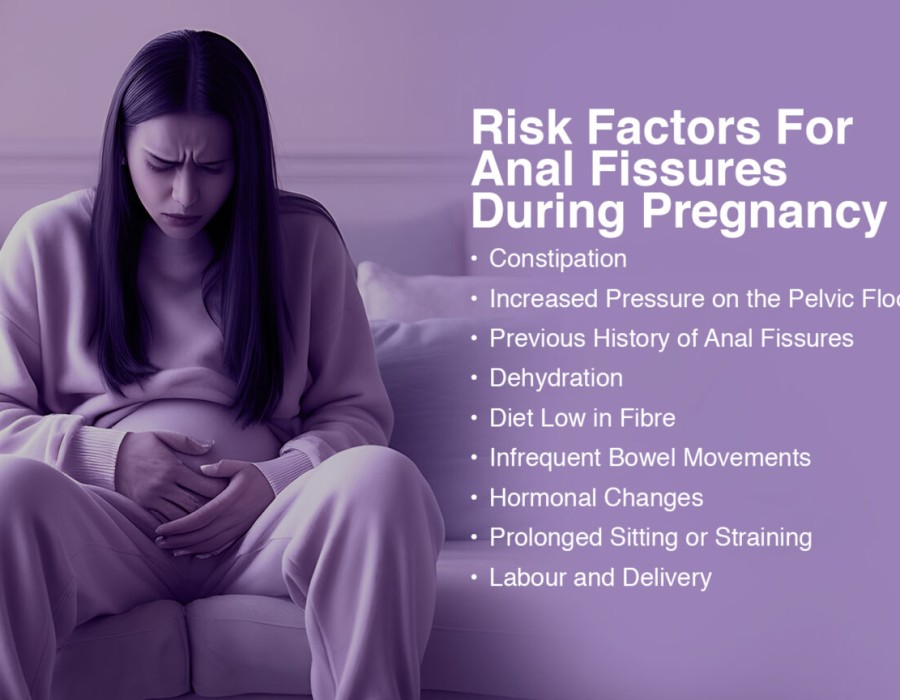Anal fissure during pregnancy is a common yet uncomfortable issue many women face. This condition refers to a small tear in the lining of the anus, which can cause significant discomfort. Fissures during pregnancy can be particularly distressing due to the heightened sensitivity and changes in the body during this time.
Understanding the risk factors for anal fissures during pregnancy can help in prevention and early management. Here are the primary risk factors explained:
Constipation:
One of the most significant risk factors for anal fissures during pregnancy is constipation. Hormonal changes during pregnancy, particularly the increase in progesterone, slow down the digestive system, leading to harder stools. Passing these hard stools can strain the anus, resulting in a fissure during pregnancy. Constipation is common during pregnancy, making it a major contributor to the development of anal fissures.
Increased Pressure on the Pelvic Floor:
As the baby grows, the uterus expands, putting additional pressure on the pelvic floor, rectum, and anus. This increased pressure can make bowel movements more difficult and painful, increasing the risk of anal fissures during pregnancy. The strain on the anus during bowel movements due to this pressure is a key factor in the formation of fissures.
Previous History of Anal Fissures:
If you have had anal fissures during a previous pregnancy or at any other time, you are at a higher risk of developing them again. The previous injury to the anal area can make the tissue more susceptible to tearing under stress. This history makes it more likely that you’ll experience pain in the anus during pregnancy due to recurrent fissures.
Dehydration:
Not drinking enough water can lead to dehydration, which in turn causes stools to become hard and dry. This condition increases the risk factors for anal fissures during pregnancy, as dry stools are more difficult to pass and can easily tear the sensitive lining of the anus. Staying hydrated is crucial to maintaining softer stools and reducing the risk.
Diet Low in Fibre:
A diet that is low in fibre can contribute to constipation, which is a significant risk factor for anal fissures during pregnancy. Fibre is essential for adding bulk to stools and making them easier to pass. Without enough fibre, stools become hard, increasing the likelihood of developing a fissure during pregnancy due to the strain placed on the anus.
Infrequent Bowel Movements:
Holding in bowel movements can lead to larger, harder stools that are more difficult to pass. This can result in anal fissures during pregnancy because the strain required to pass such stools can tear the delicate lining of the anus. Regular bowel habits are essential to reduce the risk of anal fissures during pregnancy.
Hormonal Changes:
The hormonal fluctuations during pregnancy, especially the increase in progesterone, relax the muscles throughout the body, including the intestines. This relaxation can slow down digestion, leading to constipation, a key risk factor for anal fissures during pregnancy. The hormonal impact on bowel movements is a critical aspect of why anal fissure during pregnancy is so common.
Prolonged Sitting or Straining:
Sitting for long periods or straining during bowel movements can increase the risk factors for anal fissures during pregnancy. Prolonged pressure on the anal area can lead to reduced blood flow, making the tissue more prone to tearing. This situation is especially common in the later stages of pregnancy when the baby’s weight puts extra pressure on the rectum.
Labour and Delivery:
The process of labour and vaginal delivery can also contribute to the risk of anal fissures during pregnancy. The intense pressure and strain on the pelvic floor and anus during childbirth can cause or worsen fissures. Women who experience difficult or prolonged labour are particularly at risk.
Conclusion
Managing an anal fissure during pregnancy is essential for maintaining comfort and ensuring a healthy pregnancy. By understanding the risk factors for anal fissures during pregnancy and recognising the symptoms of anal fissures, you can take proactive steps to prevent and treat this condition effectively.
At Chirag Hospital, we are dedicated to offering comprehensive care and effective treatment options for anal fissures during pregnancy. Our expert team is here to help you navigate this challenging time with the right support and personalised treatment plans to ensure a healthy and comfortable pregnancy journey.
If you’re experiencing symptoms like anal pain, itching in pregnancy or anal bleeding during pregnancy, don’t hesitate to seek professional advice. With the right care, you can manage and overcome fissures during pregnancy effectively.
Discover more about managing anal fissures during pregnancy and learn essential tips for relief





Comments